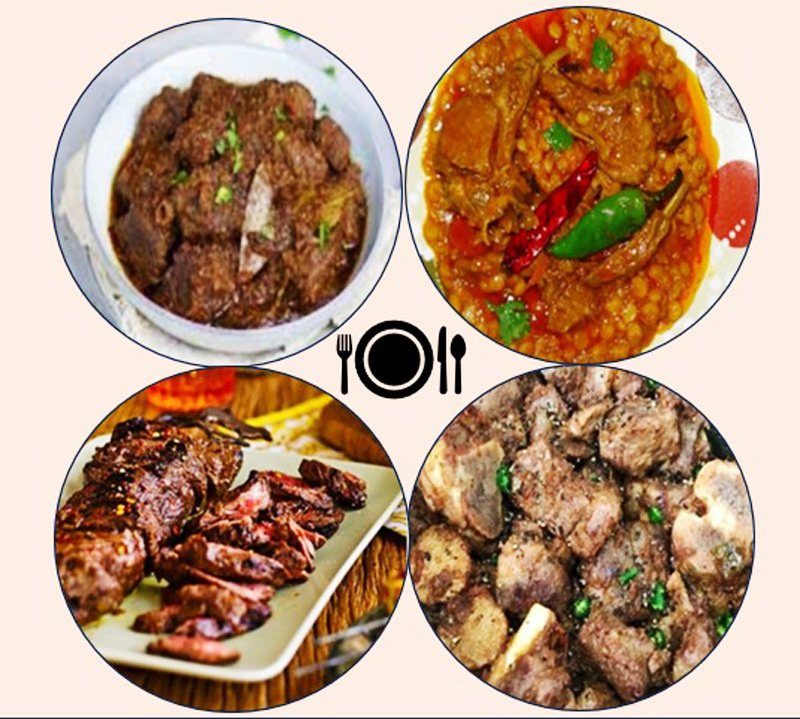How can we eat meat healthily on Eid?

Eid al-Adha means eating insufficient meat. But how do you eat meat healthily on Eid? I will talk about it today in this blog. Eid al-Adha, or called the “Festival of Sacrifice,” carries deep significance for Muslims worldwide. Hazrat Ibrahim recalls his willingness to sacrifice his son in obedience to Allah’s command. In commemoration of this law, Muslims perform the ritual of sacrifice (korban), where they slaughter animals such as goats, sheep, cows, or camels. Which is animal meat or red meat. Red meat is high in fat & cholesterol, which poses many health risks. Although eating a limited amount of meat throughout the year, the amount of meat consumption increases when Eid al-Adha comes. It is crucial to eat meat healthily on Eid. Mindful and cautious when consuming sacrificial beef to safeguard one’s well-being.
What nutrients exist in the sacrificial meat?
What nutrients exist in the meat of animals like sheep, goats, and cows? Sacrificial beef is rich in essential nutrients. It is a big source of high-quality protein vital for muscle growth and repair. Additionally, it provides necessary vitamins and minerals such as iron, zinc, and B vitamins (B12, B6, niacin and riboflavin). Iron from meat is heme iron, which is more easily absorbed by the body than non-heme iron from plant sources. These nutrients are essential to maintain overall health, supporting the immune system and preventing anemia. Moderation is vital to eating sacrificial meat during Eid-ul-Azha. Health experts recommend that adults safely eat 3 to 6 ounces (about 85 to 170 grams) of cooked meat per meal. This portion size provides enough protein and essential nutrients without consuming excessive saturated fat and cholesterol.
How to prepare meat dishes healthily.

Eid al-Adha means feasting on meat. But learn more about how to prepare meat dishes healthily.
Trim fat: Before cooking, trim visible fat from meat to reduce saturated fat intake.
Use healthier cooking methods: Grilling, baking, broiling, or steaming instead of frying helps reduce the amount of added fat and preserve the nutritional value of the meat.
Include vegetables: Serve vegetables with meat dishes. Vegetables provide fiber, vitamins, and minerals, which complement the nutritional profile of meat and aid in digestion.
Use herbs and spices: Enhance the taste of meat with herbs and spices instead of relying on high-sodium sauces and marinades. This method reduces sodium intake and adds health benefits from natural compounds found in herbs and spices.
Limit processed meat products: Avoid processed meat products such as sausages and salamis, as they often contain high levels of fats, sodium, and preservatives.
How to make Eid-ul-Azha festive period healthy and joyful.
In this chapter, we will know how to make the Eid-ul-Azha festival healthy and enjoyable. In addition to mindful eating, several other practices can help ensure that the festive period of Eid-ul-Azha is nutritious and satisfying.
Physical Activity Balance: Eid-ul-Azha means an abundance of various meaty foods. Excess food causes multiple physical complications. Include physical exercise to balance the increased caloric intake from meat foods.
Be active: Engage in light physical activity, such as walking, cycling or playing sports. Try to at least 30 minutes of moderate exercise most days of the week.
Encourage family activities: Plan family outings or activities involving physical movement. This method improves health and strengthens family bonds.
Hydrate and avoid overeating
Stay hydrated: Hydration aids digestion and helps regulate metabolism. Avoid sugary drinks and excess caffeine, which can dehydrate the body.
Eat meat, but follow the rules.
Eid al-Adha, but don’t eat meat, so what happens? Eat meat, but follow the rules. Different red meats, including cow, khasi, sheep, and buffalo, are more prominent in the food menu on Eid al-Adha. Eating this red meat continuously for a long time or overeating can lead to various diseases in the body. So, know the rules of eating meat for those suffering from diseases.
Heart disease: People with heart disease should limit to eat red meat and choose lean cuts. They should also monitor portion sizes and choose cooking methods that don’t add fat.
Diabetes: Diabetics should balance their diet by including high-fiber vegetables and whole grains. This method helps control blood sugar levels and prevents spikes.
Kidney disease: People with kidney disease should carefully monitor their protein intake. Consult a healthcare provider to determine appropriate portion sizes and types of meat that can be safely consumed.
Medicines that you should keep with you on Eid.
Sometimes, there are minor health problems, so you should keep the medicines on Eid.
Over-the-counter pain relievers
Paracetamol (acetaminophen): Paracetamol relieves mild to moderate pain and reduces fever. It relieves headaches, muscle aches, and minor aches.
Ibuprofen: Ibuprofen (NSAID) that reduces inflammation, pain, and fever.
Antacids and digestive aids:
Antacids: Overconsumption of rich, festive foods can cause heartburn or indigestion. Antacids like calcium carbonate neutralize stomach acid and quickly relieve discomfort.
H2 blockers or proton pump inhibitors (PPIs): Medicines such as ranitidine or omeprazole reduce stomach acid production and are helpful for people with chronic heartburn or acid reflux.
Anti-diarrheal medication: Loperamide can help manage diarrhea, which can occur due to dietary changes or food intolerances during the festival.
Antihistamines and allergy relief
Antihistamines: Festive gatherings can sometimes trigger allergies, whether from food, pets or seasonal allergens
Medicines that heart patients should keep with them.
Medicines for the heart to keep during Eid-ul-Azha. This is a time of joy and celebration, but it is essential for people with chronic health conditions such as heart disease and diabetes to manage their health carefully.
Necessary medicines for heart patients
Antihypertensive:
ACE inhibitors or ARBs: These drugs help manage high blood pressure and protect the heart.
Beta-blockers: Medicines such as metoprolol or atenolol slow the heart rate and lower blood pressure, helping to prevent heart attacks.
Aspirin: It helps prevent blood clots and is often prescribed to patients with a history of heart attack or stroke.
Clopidogrel or warfarin: These drugs are essential to prevent blood clots in certain heart patients or those with implanted stents.
Atorvastatin or Simvastatin: These help control cholesterol levels, reducing the risk of heart attack & stroke.
Nitroglycerin:
Sublingual tablets or spray: For angina patients, nitroglycerin can provide quick relief from chest pain
Medicines that Diabetic Patients should keep with them.
Medicines that heart patients and diabetic patients should keep with them.
Eid-ul-Azhar medicines to keep with diabetes patients. This is a time of joy and celebration, but it is essential for people with chronic health conditions such as diabetes to carefully manage their health.
Insulin:
Fast-acting insulin, such as lispro or aspart, controls blood sugar levels during meals.
Long-acting insulin: maintain baseline insulin levels such as glargine or detemir.
Oral hypoglycemics:
Metformin: This helps control blood sugar levels and is commonly prescribed for type 2 diabetes.
Sulfonylureas, such as glimepiride or glipizide, stimulate the pancreas to produce more insulin.
Glucose monitoring supplies:
Practical tips for managing medicines during Eid al-Adha
Carry a medication list: Keep a detailed list of all your medications, including dosage and timing, and share it with a family member or caregiver.
By keeping these essential medicines and supplies close at hand, heart disease and diabetes patients can effectively manage their health during Eid al-Adha.
Conclusion
The holy Eid-ul-Azha is knocking at the door and eat meat healthily on Eid . While enjoying festive food, prioritizing health and wellness is crucial. By understanding the nutritional value of sacrificial meat, consuming it in moderation and adopting healthy preparation methods, you can protect your health during this holy occasion. A healthy adult weighing 70 kg can eat 250 to 300 grams of meat daily. However, meat should be reduced if there is any other protein source. It should be divided into two to three times throughout the day instead of eating it at once.
Someone in the family may have diabetes, heart disease, high blood pressure, excess uric acid, fatty liver, and kidney complications. So, Eid food should be prepared with everyone in mind and particular health conditions should be considered to ensure joyful and health-conscious celebrations. May this Eid-ul-Azha be a time of happiness, health and harmony for all.
Author: Abdul Aziz (DMDS)
Content writer
